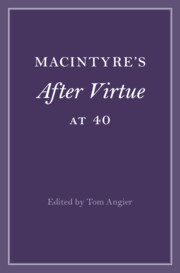Book contents
- MacIntyre’s After Virtue at 40
- Cambridge Philosophical Anniversaries
- MacIntyre’s After Virtue at 40
- Copyright page
- Contents
- Contributors
- Introduction
- Part I After Virtue and Ethical Theory
- Part II After Virtue and Political Theory
- Part III After Virtue and Narrative
- Part IV After Virtue beyond Philosophy
- 11 Theological Overtones in After Virtue
- 12 Law as Social Practice
- 13 After Virtue, Managers and Business Ethics
- Bibliography
- Index
11 - Theological Overtones in After Virtue
from Part IV - After Virtue beyond Philosophy
Published online by Cambridge University Press: 12 October 2023
- MacIntyre’s After Virtue at 40
- Cambridge Philosophical Anniversaries
- MacIntyre’s After Virtue at 40
- Copyright page
- Contents
- Contributors
- Introduction
- Part I After Virtue and Ethical Theory
- Part II After Virtue and Political Theory
- Part III After Virtue and Narrative
- Part IV After Virtue beyond Philosophy
- 11 Theological Overtones in After Virtue
- 12 Law as Social Practice
- 13 After Virtue, Managers and Business Ethics
- Bibliography
- Index
Summary
Rather notoriously, After Virtue ends with the statement that we await ‘another – doubtless very different – St. Benedict’. Benedict is a Christian theological figure associated with the formation of monastic communal life, organised around his Rule. Yet theology plays a largely silent role in MacIntyre’s book, even if its final sentence is not entirely unforeseeable. The significance of this reference has grown in certain theological circles: the ‘new monasticism’ has taken direction from theologians like Stanley Hauerwas or, more blatantly, ‘the Benedict option’, the title of theologian Rod Dreher’s popular book. An investigation of this strand of influence will shine light on features of After Virtue, such as MacIntyre’s contention that virtue thrives in ‘small communities’ and requires shared language, common practices and particular traditions. My chapter will argue that MacIntyre’s position lends support to these theological directions without requiring them. In this context, another direction will be considered: towards natural law. Less clear in After Virtue, this strand is more developed in MacIntyre’s subsequent writing, in his increased dependence on Aquinas and his investigations into the uniqueness of the human animal in Dependent Rational Animals. Theologian Jean Porter has ably developed this strand, and her dependence on MacIntyre will be considered. My chapter will conclude with an enquiry into the relation between these two strands, how they develop MacIntyre’s work differently and how they might be interwoven – particularly as natural law is considered a formative tradition.
- Type
- Chapter
- Information
- MacIntyre's After Virtue at 40 , pp. 201 - 218Publisher: Cambridge University PressPrint publication year: 2023



